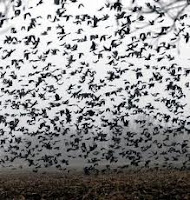My Island 4-H group has been studying crows for their birding project this year. In years past they did a general study, such as migration, where birds eat, or habitat. This year they decided to study one species and after they learned what a group of crows is called they decided this would make a great "eye-catching" display for the county fair.
PBS did a documentary a few years ago entitled "A Murder of Crows". It was interesting to find that one of the foremost researchers in the world in the study of the corvoidae family (which includes ravens, jays and magpies) is at the University of Washington. The kids decided that they would set up their own scientific study and watch the crows each Friday and Saturday when they came to bird. When the study started in January we still had the pigs and the kids would watch as the crows came to eat any left over food after the pigs ate. Sometimes it was boring, sometimes fun. Several of the group want to be scientists or archaeologists so for these 11 and 12 year olds it was a study in patience and perseverance. They found that even a fun job takes work.
From the movie we learned that crows are as intelligent as dolphins, elephants, chimps, and pigs. They have 250 unique vocalizations with two distinct dialects: one for family and the other for community. They can recognize the faces of humans, memorize garbage routes, and know when traffic lights are red.
From their own study the kids learned that crows have a scout crow (even after the pigs were slaughtered one crow would wait and then go get the others), they can tell time, and the male would eat and then take food to the female on her nest.
They studied myths of Native Americans and found that in the 20th & 21st Centuries, crows feature more often in stories than ravens did in the past.
Like the larger raven, the symbolic crow is associated with the sun, longevity, beginnings, death, change, bad luck, prophecy, and Christian solitude.
 |
| Chagall- Song of Songs |
Christians consider the crow an emblem of the Virgin Mary. The words, "I am dark, but lovely...because the sun has tanned me," are believed to mean that the light or love of God has so shown upon her that she is burned and purified as if by a mighty sun or fire (Song 1:5-6).



No comments:
Post a Comment